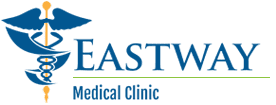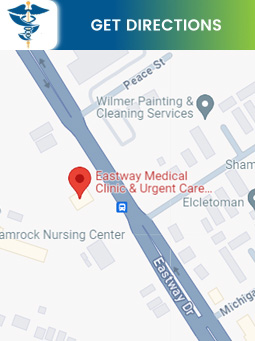FAQs for Eastway Medical Clinic in Charlotte NC
Read the following frequently asked questions to learn more about our services. Contact us for more information. We are conveniently located at 1220 Eastway Drive Charlotte, NC 28205.


Table of Contents:
Who is PEP meant for?
What is Asthma?
What to expect at your travel consult?
What is the difference between PrEP and PEP?
What is the purpose of an annual physical exam?
What should I bring with me for a DOT Physical?
What is an echocardiogram?
How is the test performed?
How to prepare for the TTE test?
How will the TTE test feel?
Why the TTE test is performed?
Risks from an external TTE test?
What types of services does Eastway Medical Clinic offer?
Who is the main provider at Eastway Medical Clinic?
Where is Eastway Medical Clinic located?
What days/hours is Eastway Medical Clinic open?
How is Eastway Medical Clinic rated?
What forms of payment are accepted at Eastway Medical Clinic?
Does Eastway Medical Clinic accept same-day appointments?
How do I book an appointment or consultation?
How should I prepare for my appointment at Eastway Medical Clinic?
Does Eastway Medical Clinic offer packages or financing options?
Does Eastway Medical Clinic accept insurance?
Do you offer pediatric and geriatric care?
What types of insurance do you accept?
Do you offer telemedicine or virtual visits?
Do I need an appointment, or can I walk in?
Is Eastway Medical Clinic accepting new patients?
Do you have a board certified doctor at Eastway Medical Clinic?
For people who don’t have HIV but may have been exposed:
• During sex
• At work through needle stick or other injuries
• By sharing injection drug equipment
• During sexual assault
Asthma is a disease that causes the airways of the lungs to swell and narrow. This reduces the amount of air that can pass through the airway. It leads to wheezing, shortness of breath, chest tightness, and coughing.
The consultation will include:
Individual review of vaccination requirements for the region being visited.
Travel recommendations for the region based on current health and safety precautions.
Vaccinations may be initiated at the time of the initial consult.
PEP means post-exposure prophylaxis, while PrEP is Pre-exposure prophylaxis. Both are methods of preventing HIV with medication. PrEP is taken every day before possible exposure, while PEP is taken within 72 hrs (3 days after) possible exposure.
A physical examination helps your PCP to determine the general status of your health and provides you with the opportunity to talk to your PCP about any ongoing pain or symptoms that you’re experiencing or any other health concerns that you might have. A physical examination is recommended at least once a year, especially in people over the age of 50. An annual physical is used to:
• Check for possible diseases so they can be treated early
• Identify any issues that may become medical concerns in the future
• Update necessary immunizations
• Ensure that you are maintaining a healthy diet and exercise routine
• Build a relationship with your PCP
• Medical Records
• List of prescription medications, and dosage you currently take
• Glasses, or if you wear contacts, let your doctor know
• Hearing Aids
An echocardiogram is a test that uses sound waves to create pictures of the heart. An echocardiogram shows the heart while it is beating, and it also shows the heart valves and other structures.
TEE (transthoracic echocardiogram) is the most common type of echocardiogram performed. During the exam, an instrument called a transducer is placed on various locations on the chest and upper abdomen which releases high-frequency sound waves that is picked up by the transducer and is converted into moving pictures of the heart by the echocardiography machine.
No special steps are needed before a TTE test. If you are having a TEE, you will not be able to eat or drink for several hours before the test.
During the test, electrodes will be placed on your naked chest to monitor your heartbeat. A gel will be applied to your chest and the transducer will be moved over your skin.
This test evaluates the valves and chambers of the heart from the outside of the body and can help detect abnormalities in the heart’s structure and function.
No known risks from an external TTE test.
Visit Eastway Medical Clinic and Urgent Care in Charlotte, North Carolina, if you need any of the Services listed above. Our very compassionate doctors will take good care of you. Contact us or go online to make an appointment. We also offer same-day appointments and take walk-ins.
They offer urgent care and primary care for illnesses, minor injuries, chronic conditions, physicals, women’s and men’s health, lab & X‑ray services, PrEP HIV prevention, allergy testing and more.
Care is provided by board‑certified physicians, including Dr. Sylvia Okoye, MD and Dr. Joseph Okoye, MD.
They are at 1220 Eastway Drive, Charlotte, NC 28205.
Open Mon–Fri 8:30 am–5:30 pm and Sat 9:00 am–2:30 pm; closed Sunday.
The clinic has positive patient reviews with high ratings from visitors.
They accept most major insurances, Medicare, Medicaid, self‑pay, and offer discounts for uninsured patients.
Yes — urgent care services are available for same‑day or walk‑in visits.
You can book online, call the clinic, or walk in during business hours.
Bring your ID, insurance card (if applicable), and any medical history or medication list — typical primary/urgent care prep (context from site guidance).
They don’t list specific packages or financing plans, but offer affordable self‑pay rates and discounts for uninsured patients.
Yes — they accept most major insurance plans, including in‑network and out‑of‑network options.
Yes — they provide care for patients of all ages, including children and seniors.
They work with Aetna, Blue Cross Blue Shield, Cigna, Humana, UnitedHealthcare, Medicare, Medicaid and more; verify with the office for specifics.
They do offer telemedicine (virtual consultations) as part of their services.
You can walk in for urgent care or schedule an appointment for primary care.
Yes — they are accepting new patients for both urgent and primary care.
Yes — Dr. Sylvia Okoye, MD and Dr. Joseph Okoye, MD are both board‑certified physicians providing care at Eastway Medical Clinic.




